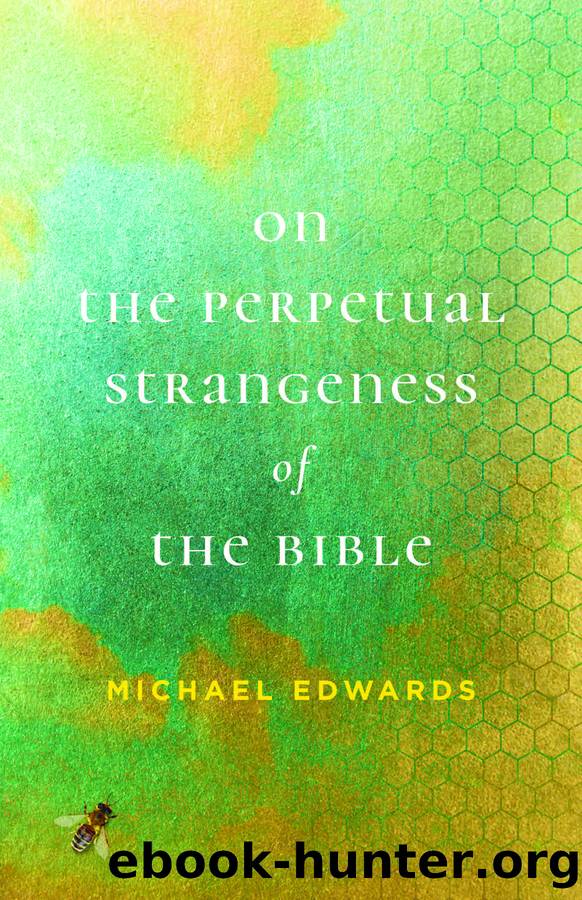On the Perpetual Strangeness of the Bible by Michael Edwards;

Author:Michael Edwards;
Language: eng
Format: epub
Publisher: Lightning Source Inc. (Tier 3)
5
The question is not whether heaven is different from where we are, the reply to that being obvious, but rather: how should we live the idea of heaven? As a remote otherwhere, or as a world infinitively near? In special circumstances humans have had glimpses of heaven; most of us have not. But then neither have we heard valleys that âshout for joyâ and âsingâ (psalm 65:13), nor heard the sun and moon praising God, nor mountains and hills, nor cattle and birds. We are deaf to the continual song of the creation, which we know from Psalm 148 to be a fact; perhaps we are blind, through sin, to the unceasing presence of heaven. According to the âOde: Intimations of Immortality,â Wordsworth discovered on reaching manhood that a âgloryâ had passed away from the earth (line 18), whereas, in what he took to be a universal experience, âHeaven lies about us in our infancy!â (line 66). Many must indeed recognize themselves in this famous line, even if they also carry in their memories the fact that they lived, as children, in a cruel world of which they were themselves a sign. That sense of an earlier âheavenâ is, in any case, a realization of the adult, an effect of memory, and what one experiences is more accurately the loss of Eden, the knowledge of oneâs exile. Each of us enacts, provided we are thus blessed, the Fall, here and now, the being refused a world of presence and âglory.â If we are even more blessed, by becoming Christians, we sense that what âlies about usâ here and now is heaven. And not only in Wordsworthâs âFountains, Meadows, Hills, and Grovesâ (l. 188)âthough the earth is indeed alive with heavenâs praiseâsince in any circumstances we may awaken to the presence of God and of his world. We do not need to be told that we are not in heaven; we do need to be told that, in a sense, we are.
Laying aside my book during a seemingly endless autumn afternoon in our Burgundy garden, I became aware of the quiet complexity of the leaves, branches, and twigs of the hazel tree under which I was seated, of the slow avalanche of green in the lawns and in so many other trees conspiring with the blue of the sky, and of the strength of the sun in the darkness of the shadows. By ceasing to think and absorbing what I saw, I felt the scene deepen and become prodigiously itself, more real than usual and with a different kind of reality, and time dispersed through having no hold. The very notion of being gradually changed. Everything I saw and heard simply was, at once withdrawn into itself and part of the whole, while I myself was no longer a self-consciousness, was no longer important, but simply the partaker through whom the phenomenon could be observed. The stillness of the moment seemed to admit a kind of eternity, and the presences around me, including an old stone wall, to be touched with infinity.
Download
This site does not store any files on its server. We only index and link to content provided by other sites. Please contact the content providers to delete copyright contents if any and email us, we'll remove relevant links or contents immediately.
Getting It, Then Getting Along by L. Reynolds Andiric(650)
Religion and Politics Beyond the Culture Wars : New Directions in a Divided America by Darren Dochuk(557)
Global Justice, Christology and Christian Ethics by Lisa Sowle Cahill(428)
Positive Psychology in Christian Perspective: Foundations, Concepts, and Applications by Charles Hackney(352)
Forgiveness and Christian Ethics by Unknown(342)
Douglas Hamp The First Six Days by Unknown(291)
The Horrors and Absurdities of Religion by Arthur Schopenhauer(268)
Insurgency, Counter-insurgency and Policing in Centre-West Mexico, 1926-1929 by Mark Lawrence(253)
Middle Eastern Minorities: The Impact of the Arab Spring by Ibrahim Zabad(245)
Christian Martyrdom and Christian Violence by Matthew D. Lundberg;(240)
Beyond Heaven and Earth by Gabriel Levy(231)
God and Eros by Patterson Colin;Sweeney Conor;(229)
The Oxford Handbook of Greek and Roman Mythography by R. Scott Smith;Stephen M. Trzaskoma;(228)
The Bloomsbury Reader in Christian-Muslim Relations, 600-1500 by David Thomas;(223)
Autobiography, Volume 2: 1937-1960, Exile's Odyssey by Mircea Eliade(214)
Witches: the history of a persecution by Nigel Cawthorne(210)
Cult Trip by Anke Richter(208)
An Introduction to Kierkegaard by Peter Vardy(197)
The Myth of Disenchantment by Jason A. Josephson-Storm(189)
